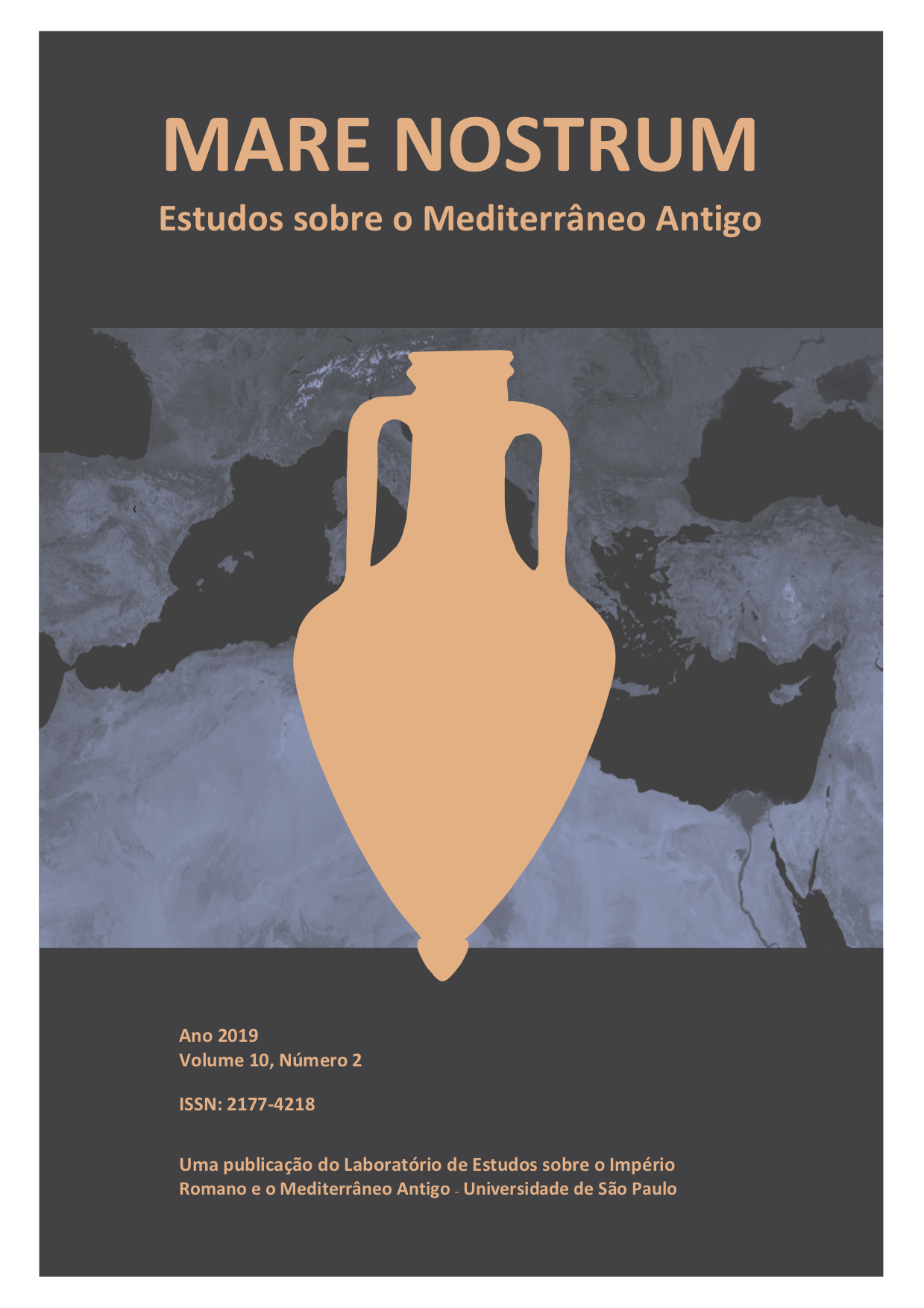William L. Westermann entre o Antiquarismo e a História Comparada da Escravidão
Uma Releitura de The Slave Systems of Greek and Roman Antiquity
DOI:
https://doi.org/10.11606/issn.2177-4218.v10i2p187-208Palavras-chave:
Escravidão Antiga; História Comparada; William L. Westermann; Frank Tannenbaum.Resumo
O livro de William L. Westermann, The Slave Systems of Greek and Roman Antiquity, publicado em 1955, é até hoje uma referência para o estudo da escravidão antiga. No entanto, este livro é frequentemente criticado por sua estrutura antiquária e, portanto, pela falta de qualquer abordagem teórica sobre a escravidão no mundo antigo. Esse ponto de vista foi enfatizado principalmente por Moses Finley, com sua obra Ancient Slavery and Modern Ideology (1980), e tornou-se, desde então, um certo consenso na historiografia da escravidão. Este artigo argumenta que tal abordagem negligencia o lugar do livro de Westermann nos debates sobre a história comparada da escravidão que ocorreram nos Estados Unidos durante a segunda metade do século XX. Existem semelhanças entre a tese de Frank Tannenbaum sobre os diferentes níveis de severidade nos sistemas escravistas nas Américas, apresentados em seu Slave and Citizen (1946), e a visão de Westermann acerca dos antigos sistemas escravistas. Essa semelhança é compreensível se levarmos em conta que ambos participaram de seminários sobre a história do trabalho e da escravidão na Universidade de Columbia.
Downloads
Referências
Bowersock, Glen W. Westermann’s Role in the Development of Ancient History in America. Conferência proferida em Madison, Wisconsin, não publicada, 2000.
Brunt, P. A. Review of The Slave Systems of Greek and Roman Antiquity by W. L. Westermann; Istoria Sclavajului in Dacia Romana by D. Tudor; Struktur der Antiken Sklavenkriege by J. Vogt. The Journal of Roman Studies, 48(1/2), 1958, p. 164-70.
Calder III, William M. Nuda Veritas: William Abbott Oldfather on Classics at Columbia. Illinois Classical Studies, 18, 1993, p. 359-78.
Cooper Jr., John Milton. William Linn Westermann at the Paris Peace Conference of 1919. In: Meckler, Michael (ed.) Classical Antiquity and the Politics of America: from George Washington to George W. Bush. Waco: Baylor University Press, 2006, p. 83-93.
Dal Lago, Enrico; Katsari, Constantina. The study of ancient and modern slave systems: Setting an agenda for comparison. In Dal Lago, Enrico; Katsari, Constantina (eds.) Slave Systems: Ancient and Modern. Cambridge: Cambridge University Press, 2008, p. 3-31.
De la Fuente, Alejandro. From Slaves to Citizens? Tannenbaum and the Debates on Slavery, Emancipation, and Race Relations in Latin America. International Labor and Working-Class History, 77(01), 2010, p. 154-73.
Drimmer, Melvin. Thoughts on the Study of Slavery in the Americas and the Writing of Black History. Phylon, 36(2), 1975, p. 125-39.
Dumont, Jean Christian. Servus: Rome et l’esclavage sous la République. Rome: École Française de Rome, 1987.
El Hamel, Chouki. Black Morocco: A History of Slavery, Race, and Islam. Cambridge: Cambridge University Press, 2010.
Finkelstein, Moses I. Review of Westermann, William Linn, Sklaverei, in Paulys Realencyclopädie der classischen Altertumswissenschaft. Zeitschrift für Sozialforschung, 5, 1936, p. 441-2.
Finley, Moses I. Between Slavery and Freedom. Comparative Studies in Society and History, 6(3), 1964, p. 233-49.
Finley, Moses I. Ancient Slavery and Modern Ideology. Expanded edition edited by Brent D. Shaw. Princeton: Markus Wiener Publishers, 1998.
Fynn-Paul, Jeffrey. Empire, Monotheism and Slavery in the Greater Mediterranean Region from Antiquity to the Early Modern Era. Past and Present, 205, 2009, p. 3-40.
Hannan, Caryn. Illinois Biographical Dictionary. 2 vols. Hamburg: State History Publications, 2008.
Harper, Kyle. Slavery in the Late Roman World, AD 275-425. Cambridge/New York: Cambridge University Press, 2011.
Jones, Arnold. H. M. Review of The Slave Systems of Greek and Roman Antiquity by W. L. Westermann. The English Historical Review, 71(279), 1956, p. 272-5.
Kamen, Deborah. Status in Classical Athens. Princeton: Princeton University Press, 2013.
Kyrtatas, Dimitris. Slavery and economy in the Greek world. In: Bradley, Keith; Cartledge, Paul (eds.) The Cambridge World History of Slavery, vol. 1. Cambridge: Cambridge University Press, 2011, p. 91-111.
Lenski, Noel. Framing the Question: What Is a Slave Society? In: Lenski, Noel; Cameron, Catherine M. (eds.) What Is a Slave Society?: The Practice of Slavery in Global Perspective. Cambridge: Cambridge University Press, 2018, p. 15-58.
Lewis, David M. Greek Slave Systems in their Eastern Mediterranean Context, c. 800-146 BC. Oxford: Oxford University Press, 2018.
Maier, Joseph; Weatherhead, Richard W. Frank Tannenbaum: A Biographical Essay. New York: University Seminars - Columbia University, 1974.
Marquese, Rafael de Bivar. A História Global da Escravidão Atlântica: Balanço e Perspectivas. Esboços, 26(41), 2019, p. 14-41.
Mintz, Sidney W. Slavery and Emergent Capitalisms. In: Foner, Laura; Genovese, Eugene D. (eds.) Slavery in the New World: A Reader in Comparative History. New Jersey: Prentice-Hall, 1969, p. 27-37.
Palmeira, Miguel S. Moses Finley e a Economia Antiga: A Produção Social de uma Inovação Historiográfica. São Paulo: Intermeios; USP-Programa de Pós-Graduação em História Social, 2018.
Pearson, Harry W. The secular debate on economic primitivism. In: Polanyi, Karl; Arensberg, Carl M.; Pearson, Harry W. (orgs.) Trade and Market in the Early Empires. Economies in history and theory. Glencoe (Ill.): Free Press, 1957, p. 3-11.
Perry, Jonathan S. From Frankfurt to Westermann: Forced Labor and the Early Development of Finley’s Thought. American Journal of Philology, 135(2), 2014, p. 221-41.
Polanyi, Karl. Review of The Slave Systems of Greek and Roman Antiquity by W. L. Westermann. The Journal of Economic History, 17(1), 1957, p. 120-3.
Scarano, Francisco A. Slavery and Emancipation in Caribbean History. In: Higman, Barry W. (ed.) General History of the Caribbean, vol. VI, Methodology and Historiography of the Caribbean. Kingston: UNESCO, 1999, p. 233-82.
Schiavone, Aldo. La storia spezzata: Roma antica e Occidente moderno. Roma-Bari: Editori Laterza, 1999.
Shaw, Brent D. “A Wolf by the Ears”: M. I. Finley’s Ancient slavery and modern ideology in historical context. In: FINLEY, M. I. Ancient slavery and modern ideology. Expanded edition edited by Brent D. Shaw. Princeton: Markus Wiener Publishers, 1998, p. 3-74.
Shaw, Brent D. Under Russian Eyes. The Journal of Roman Studies, 82, 1992, p. 216-28.
Smith, Morton. Elias J. Bickerman. Proceedings of the American Academy for Jewish Research, 50, 1983, p. xv-xviii.
Ste Croix, Geoffrey E. M. de. Review of The Slave Systems of Greek and Roman Antiquity by W. L. Westermann. The Classical Review, 7(1), 1957, p. 54-9.
Tannenbaum, Frank. Slave and Citizen: The Negro in the Americas. New York: Vintage Books, 1946.
Tannenbaum, Frank. The University Seminar Movement at Columbia University. Political Science Quarterly, 68(2), 1953, p. 161-80.
Toynbee, Arnold J. Acquaintances. London: Oxford University Press,1967.
Versiani, Flávio Rabelo. Escravidão “suave” no Brasil: Gilberto Freyre tinha razão?. Rev. Econ. Polit., 27(2), 2007, p.163-83.
Vlassopoulos, Kostas. Does slavery have a history? The consequences of a global approach. Journal of Global Slavery, 1, 2016, p. 5-27.
Vlassopoulos, Kostas. Finley’s Slavery. In Jew, Daniel; Osborne, Robin; Scott, Michael (eds.) M. I. Finley: An Ancient Historian and his Impact. Cambridge: Cambridge University Press, 2016, p. 76-99.
Westermann, William L. Sklaverei. In Paulys Realencyclopädie der classischen Altertumswissenschaft, Supplementband VI, cols. 894-1068. Stuttgart: Metzler, 1935.
Westermann, William L. The slave systems of Greek and Roman Antiquity. Philadelphia: American Philosophical Society, 1955.
Wiedemann, Thomas E. J. Fifty years of research on ancient slavery: The Mainz Academy Project. Slavery & Abolition: A Journal of Slave and Post-Slave Studies, 21(3), 2000, p. 152-58.
Downloads
Publicado
Edição
Seção
Licença
Os conteúdos expressos nos textos publicados pela Mare Nostrum são de exclusiva responsabilidade de seus respectivos autores.
A reprodução dos textos editados pela Mare Nostrum é permitida sob licença Creative Commons, Atribuição-NãoComercial (CC BY-NC).
Autores que publicam nesta revista concordam com os seguintes termos:
- Autores mantém os direitos autorais e concedem à revista o direito de primeira publicação, com o trabalho simultaneamente licenciado sob a Licença Creative Commons Attribution que permite o compartilhamento do trabalho com reconhecimento da autoria e publicação inicial nesta revista.
- Autores têm autorização para assumir contratos adicionais separadamente, para distribuição não-exclusiva da versão do trabalho publicada nesta revista (ex.: publicar em repositório institucional ou como capítulo de livro), com reconhecimento de autoria e publicação inicial nesta revista.
- Autores têm permissão e são estimulados a publicar e distribuir seu trabalho online (ex.: em repositórios institucionais ou na sua página pessoal) a qualquer ponto antes ou durante o processo editorial, já que isso pode gerar alterações produtivas, bem como aumentar o impacto e a citação do trabalho publicado (Veja O Efeito do Acesso Livre).









